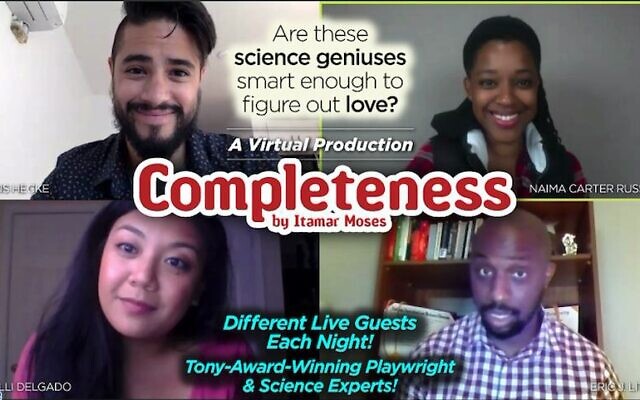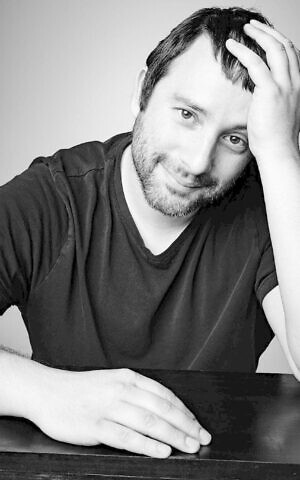Love and Science Collide in Horizon Theatre Production
‘Completeness’ is a romantic comedy with a distinct difference.

Love and romance and the utter unpredictability of human relationships gets a provocative examination in “Completeness,” a play by the playwright Itamar Moses that is getting a staged reading at the Horizon Theatre in Atlanta.
The drama examines how two young scientists, Elliot and Molly, attempt to figure out their budding love in terms of the science each is working on. The question the play seeks to answers is whether Elliot’s work in computer technology and Molly’s research as a molecular biologist has anything to say about what turns them on to each other. How much, after all, can their romantic ups and downs be explained by the science they create?
Moses, the play’s author, who grew up Jewish in Berkley, Calif., and now lives in Brooklyn, scored a big win at the 2018 Tony Awards for his dramatization for the Broadway musical “The Band’s Visit,” which won a total of 10 Tonys. It was based on the 2007 Israeli film hit of the same name.

According to the Horizon Theatre, Moses connects the idea for “Completeness” back to a college engineering course, where he learned about the traveling salesman problem.
“I remember liking how simple the problem was and that it had this evocative, nonscience-sounding name,” Moses said. “The traveling salesman problem … is essentially a problem of choice-making when there are too many possibilities, and it suddenly occurred to me that it was a good metaphor for choosing a life partner. I immediately saw the seeds of a romantic comedy about someone working on the problem who also sees it manifest in his personal life, and my protagonist, Elliot, was born.”
Audiences for Oct. 2-3 performance will have a chance to discuss their own ideas about how much science can say about life’s complex questions. Horizon Theatre has partnered with Science ATL to facilitate conversations after each performance. The public events coordinator for the science organization, Kellie Vinal, has invited local researchers to participate.
“I’ve invited scientists with a wide range of backgrounds and experiences within the fields of computer science and molecular biology. I think the unique combinations of expertise and experiences will make for a lively discussion.”
The play’s title is derived from the scientific theory of completeness that examines whether science is complete and unitary. While there have been many theories about the question, science has been unable to put forward an explanation of life as a seamless whole.
Daniel Matt, the noted scholar of mystical Judaism and the translator of the many books of the Zohar of Kabbalah, discussed the issue when he spoke at Temple Sinai in Sandy Springs in 2018.
In his book “God & the Big Bang,” he writes about the limitations of science in explaining the more profound questions of life.
“We are part of something greater: a vast web of existence constantly expanding and evolving. When we gaze at the nighttime sky, we can ponder that we are made of elements forged within stars, out of particles born in the big bang. … But neither God nor the Big Bang are that far away.”
One of Britain leading scientists Colin Humphreys, a professor of material science at Cambridge University, is described in The Guardian newspaper in 2003 as a believer in the power of science to explain the physical world, but he is also a believer in religion.
“I think you can explain the universe without invoking God at all. And you can explain humans without invoking God at all, I think. But where I differ from the people who say, OK, the universe started with a big bang – if it did, it’s not too sure, but let’s say it did – and everything else was chance event, then I would say that God is the God of chance and He had His plan and purpose, which is working out very subtly, but through these chance events.”
The Horizon’s production of “Completeness” owes much to present-day technology. Each of the actors in the staged reading will be performing from their own home and connected through virtual computer programs. It is part of the Horizon at Home series, which has sought to keep alive interest in theatrical works while the theaters themselves are dark because of the COVID-19 pandemic.
“Staying at home is changing the way we see the arts world, especially theater,” according to the Horizon’s video and sound designer Amy Levin. “We want to make sure everyone still has access to plays, so it’s become a matter of translating something written specifically for one medium and adapting it to another.”
Tickets for the performance are free but donations of at least $10 per person are encouraged and registration is required. Audiences can register to attend at horizontheater.com.horizon-at-home-completeness.



comments